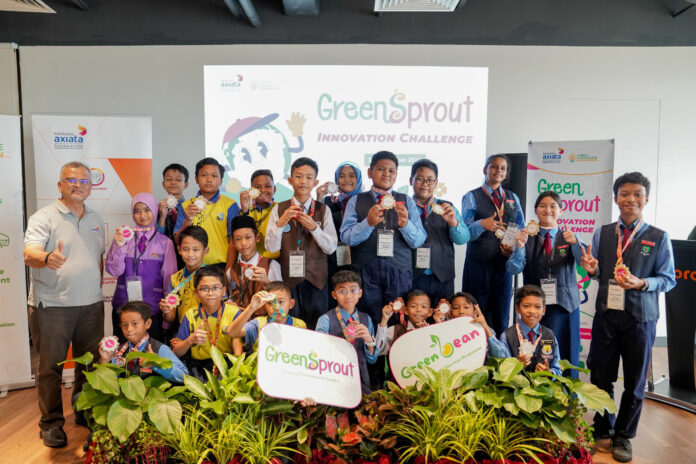
KUALA LUMPUR, October 20, 2024: Forest Interactive Foundation, in collaboration with Axiata Foundation, announces the winners of the Green Sprout Innovation Challenge, a key initiative under the Environmental Education Programme on the 3rd September 2024.
Winners from this competition, made up of primary school students aged 10 to 12, showcased innovative and practical solutions for urban farming, aimed at enhancing food security and promoting sustainable practices.
About the Environmental Education Programme
Launched as part of a broader effort to foster environmental awareness and stewardship, the Environmental Education Programme, an expansion of last year’s partnership, encompasses two main initiatives: The second cohort of Green Bean and inaugural cohort of Green Sprout. The Environmental Education Programme for each of the eight schools across Peninsular Malaysia is structured over three days for Green Bean and condensed into two for Green Sprout each week at the respective schools, spanning July for the hands-on experiences to reinforce environmental responsibility.
This educational initiative aims to empower young Malaysians with knowledge about sustainability and the 17 Sustainable Development Goals (SDGs), while equipping them with modern digital tools. By incorporating innovative platforms like coding, Microbit technology, and more, the programme nurtures creativity and problem-solving skills in environmental contexts.
Green Sprout Innovation Challenge Overview
The Green Sprout Innovation Challenge addresses the pressing need for sustainable food solutions in urban environments. Participants were tasked with designing innovative farming systems specifically for small urban spaces, such as condominiums and apartments. The main objective is to create systems that help families grow their own food, thereby enhancing food security and reducing grocery expenses.
To align with the challenge’s focus on sustainability, all proposed solutions are budget-friendly, user-friendly, and made from recyclable materials. This emphasis ensures that the solutions are both practical and environmentally responsible, making them accessible to a wide audience.
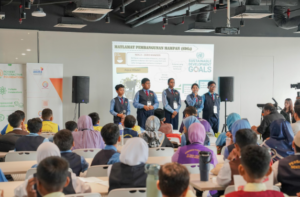
The competition format includes both theoretical and practical elements. Teams presented their projects in a 15-minute format, which is divided into two segments. The first segment is a 5-minute presentation, followed by a 5-minute demonstration of their prototype, where participants showcase its functionality and effectiveness. The last segment is a 5-minute Q&A session with a panel of judges, allowing teams to address questions and provide further insights into their projects. This format not only highlights the participants’ creativity and technical skills but also tests their ability to effectively communicate their ideas.
Johary Mustapha, Founder & CEO of Forest Interactive Foundation, expressed, “The Environmental Education Program, which culminated in the Green Sprout Innovation Challenge, represents our commitment to nurturing young talent and promoting environmental sustainability. The innovative solutions presented by these students underscore their dedication to creating impactful and practical environmental solutions.”
A panel of judges, including Mohd Farid Zainal Abidin, CEO of Elvira Systems, Prof. Madya Dr. Zaleha Kassim, Associate Professor at the Planetary Sustainability Institute for Sustainable Well-being, International Islamic University, and Faizul Anuar, Manager K-12, Digital Talent Development at MDEC, evaluated the projects based on creativity, practicality, and sustainability.
Winners of the Green Sprout Innovation Challenge
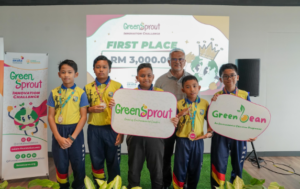
- SK Bukit Piatu
- Project Name: My Home Farmer
- Brief Summary: An aquaponic system that combines aquaculture (fish breeding) and hydroponics.
- Prize Money: MYR 3,000
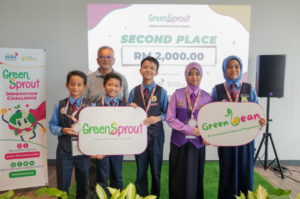
Second place winners- SK Desa Cempaka
- SK Desa Cempaka
- Project Name: Eco-friendly Aquaponic
- Brief Summary: An aquaponic system integrating aquaculture and hydroponics. Fish waste and water are used as nutrients for plants.
- Prize Money: MYR 2,000
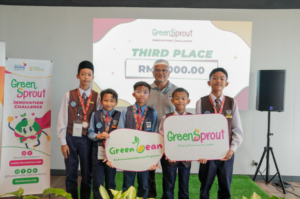
Third place winners- SK Cheras Jaya
- SK Cheras Jaya
- Project Name: Mobifarm
- Brief Summary: A mobile system that combines hydroponics and aquaculture, monitored automatically using Microbit technology.
- Prize Money: MYR 1,000
Mohamad Kamal Nawawi, CEO at Axiata Foundation, highlighted, “We are proud to support the Green Sprout Innovation Challenge and witness the creativity and enthusiasm of Malaysia’s youth. This initiative aligns with our mission to foster environmental stewardship and empower young innovators to contribute to a sustainable future.”
The top three teams showcased their projects at the #mydigitalmaker Fair, organized by the Malaysia Digital Economy Corporation (MDEC), from September 13-15, 2024, at the Kuala Lumpur Convention Centre (KLCC).
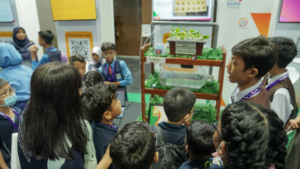
“The Green Sprout Innovation Challenge not only highlights the remarkable ingenuity of Malaysia’s youth but also reflects the growing commitment to sustainable living within the community,” highlights Nisa Saharuddin, Programme and Community Outreach Manager, at Forest Interactive Foundation, “By addressing real-world issues with practical solutions, the challenge plays a vital role in shaping the future of urban farming and environmental responsibility.
Forest Interactive Foundation and Axiata Foundation look forward to continuing their collaboration and supporting initiatives that drive positive change and foster a greener, more sustainable future for all.